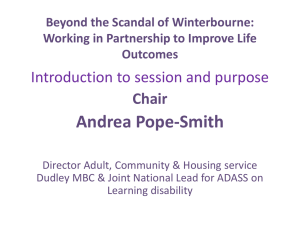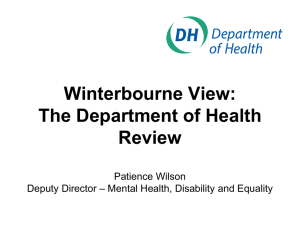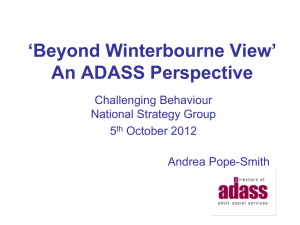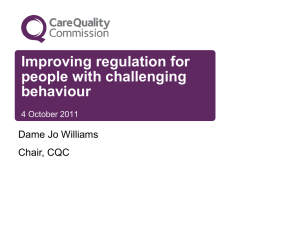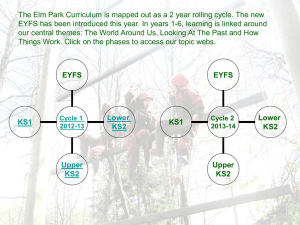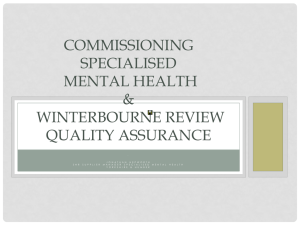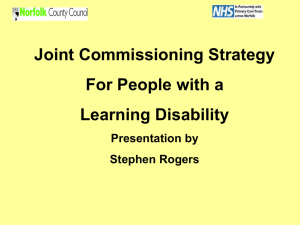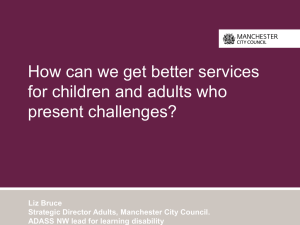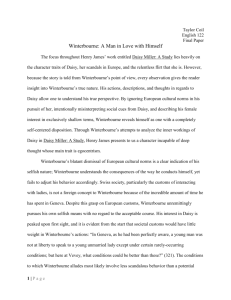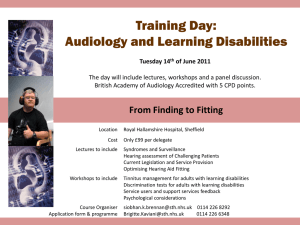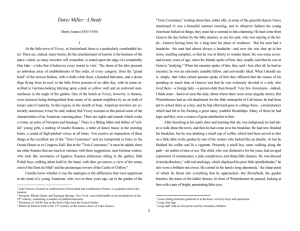Key Lessons from Winterbourne View presentation
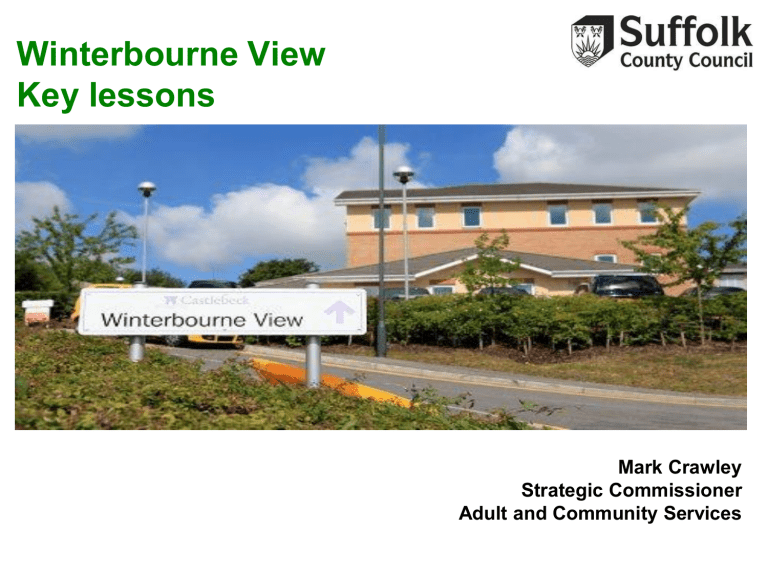
Winterbourne View
Key lessons
Andrea Pope-Smith
Joint Chair – ADASS LD Policy Network
Mark Crawley
Strategic Commissioner
Adult and Community Services
Winterbourne View
Background
The BBC’s Panorama investigation was aired on 31 st of May
2011 and uncovered serious physical and mental abuse of patients being perpetrated by staff at Winterbourne View
Hospital
•
•
•
•
As a result, several immediate responses were set in train:
A criminal investigation was launched culminating in 11 individuals being prosecuted, leading to convictions and sentencing on the 26 th of October 2012
The CQC reviewed all services operated by Castlebeck Care, the owners of
Winterbourne View, and undertook a programme of inspections of 150 learning disability hospitals and homes.
The NHS South of England reviewed serious untoward incident reports and the commissioning of places at Winterbourne View
An independent Serious Case Review was commissioned by South Gloucestershire
Safeguarding Board and published on 7 th August 2012
Winterbourne View
• Transforming Care: A national response to
Winterbourne View Hospital.
Department of Health Review: Final Report
(Delayed until criminal proceedings had been completed.)
• DH Winterbourne View Review
Concordat: Programme of Action
Transforming Care:
A national response to
Winterbourne View Hospital
Department of Health review: Final Report
“ Like many, I have felt shock, anger, dismay and deep regret that vulnerable people were able to be treated in such an unacceptable way, and that the serious concerns raised by their families were ignored by the authorities for so long.
Stronger regulation and inspection, quality information and clearer accountability are vital, so too is developing a supportive, open and positive culture in our care system.
I want staff to feel able to speak out - as well as getting the training and support they need
For me, this is the bigger leadership and cultural challenge that this scandal has exposed – and answering it will mean listening and involving people with learning disabilities and their families more than ever before.
As much as Winterbourne View fills us all with sorrow and anger, it should also fire us up to pursue real change and improvement in the future.”
NORMAN LAMB
Transforming Care:
DoH Review: Final Report
Key Findings
• The abuse at Winterbourne View hospital was criminal
• Management allowed a culture of abuse to flourish. Warning signs were not picked up or acted on by health or local authorities, and concerns raised by a whistleblower went unheeded
• The abuse was only the beginning of the story - many of the actions in the report cover the wider issue of how as a country we care for people with learning disabilities or autism, who have what is often described as challenging behaviour.
• Aside from the poor care and abuse, many of the people being treated there should not have been there in the first place. They had been sent there – to a closed hospital setting – for what should have been shortterm assessment, but some had been left there for much longer
Transforming Care:
DoH Review: Final Report
Key Findings
•
•
•
•
•
•
Even where hospitals are run to the highest standards, they are still, for many people, the wrong place, offering the wrong sort of care.
People with learning disabilities or autism may sometimes need hospital care; but hospitals are not where people should live.
This is a wider scandal, on a national scale, that Winterbourne View revealed, and it is unacceptable.
We should no more tolerate that people with learning disabilities or autism are being given the wrong care- against best practise that has been established for many years
– that we would accept the wrong treatment being given for cancer.
People with challenging behaviours can be, and have a right to be, offered the support and care that they need in a community-based setting, as near as possible to family and other connections.
Closed institutions, with people far from home and family members, not only deny people the right care but present the risk of a culture of poor care and abuse.
Transforming Care:
DoH Review: Final Report
Key Recommendations
• Only local action can guarantee good practice, stop abuse and transform local services.
•
Listen to people with learning disabilities and their family carers in developing person-centred approaches across commissioning and care
• Build understanding of the reasonable adjustments needed for people with learning disabilities who have a mental health problem so that they can make use of local generic mental health beds
•
Commission the right model of care to focus on the needs of individual people, looking to avoid the factors which might distress people and make behaviours more challenging, building positive relationships in current care settings
• Focus on early detection, prevention, crisis support and specialist long term support to minimise the numbers of people reaching a crisis which could mean going into hospitals
•
Work together to plan carefully and commission services for the care of children as they approach adulthood to avoid crises; and Commission flexible, communitybased services.
DH Winterbourne View
Review
Concordat: Programme of Action
The Government’s Mandate
• A rapid reduction in hospital placements for this group of people by 1 June
2014. People should not live in hospital for long periods of time. Hospitals are not homes.
• “The presumption should always be that services are local and that people remain in their communities”
• We will safeguard people’s dignity and rights through a commitment to the development of personalised, local, high quality services. Failures will be dealt with quickly and decisively through improved safeguarding arrangements. Safeguarding is everybody’s business.
• All parts of the system (- commissioners, providers, the workforce, regulators and government - and all agencies - councils, providers, the NHS and police) - have a role to play in driving up standards for this group of people. There should be zero tolerance of abuse or neglect.
Some lessons from Winterbourne
View - Margaret Flynn
Serious Case Review for S. Gloucestershire Council
What Matters. What ex-patients and their families sought
• Relationship centred support in their own localities
• Empathic and mature staff who are sensitive to people’s subjective experience, histories and aspirations
• Recognition for the emotional demands of their working with people with troubled histories
• Staff with positive experiences of working with people with learning disabilities and autism
• Staff to have good role models and effective managers
• To have their perspectives and experience acknowledged
• Money for hospitals to be transferred to their communities
• Credible commissioning – where NHS Commissioners know what they are buying
DH Winterbourne View
Review
Concordat: Programme of Action
Concordat : Programme of Action
• Health and care commissioners will review all current hospital placements and support everyone inappropriately placed in hospital to move to community-based support as quickly as possible and no later than 1 June 2014
• Every area will put in place a locally agreed joint plan for high quality care and support services for people of all ages with challenging behaviour, that accords with the model of good care.
• There will be national leadership and support for local change.
• Planning will start from childhood improving the quality and safety of care
• Accountability and corporate responsibility for the quality of care will be strengthened
• Regulation and inspection of providers will be tightened
• Progress in transforming care and redesigning services will be monitored and reported:
DH Winterbourne View
Review
• Reporting to Adult Safeguarding Board
• Reporting to ACS Management Team
- joint governance with the NHS
• Stocktake of progress against the concordat commitments, by 5 th July
Norman Lamb’s letter to Chairs of Health and Wellbeing Boards,
Council Leaders and Chief Executives and Chairs and Chief
Operating Officers of CCGs
“A joint strategic plan to deliver the range of local health care and housing support services to meet the needs of children, young people and adults with challenging behaviour in their area.”
• Joint Improvement Board –
“The stocktake can only successfully be delivered through local partnerships. We would specifically ask that the responses are developed with local partners and shared with your Health and Wellbeing Board. We would also ask that CCG’s sign off the completed stocktake.”
